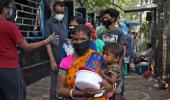Observing domestic violence cases need to be handled with utmost sensitivity, the Supreme Court on Friday said family members of an accused cannot be implicated without specific charge in the criminal case in a sweeping manner.

A bench of Justices BV Nagarathna and N Kotiswar Singh said in matrimonial disputes, emotions run high, and there may be a tendency to implicate other members of the family who do not come to the rescue of the complainant or remain mute spectators to any alleged incident of harassment.
"In criminal cases relating to domestic violence, the complaints and charges should be specific, as far as possible, as against each and every member of the family who are accused of such offences and sought to be prosecuted, as otherwise, it may amount to misuse of the stringent criminal process by indiscriminately dragging all the members of the family," said the court.
The observations reflected in a judgement that quashed the criminal proceeding against the family members against whom a woman filed a domestic violence case aside from her in laws.
The Telangana High Court had refused to quash the proceedings against the maternal aunt and cousin of the main accused.
The top court said it couldn't constitute a criminal act without there being specific acts attributed to the family members.
When tempers run high and relationships turn bitter, there is also a propensity to exaggerate the allegations, which does not necessarily mean that such domestic disputes should be given the colour of criminality, it added.
"There may be situations where some of the family members or relatives may turn a blind eye to the violence or harassment perpetrated to the victim, and may not extend any helping hand to the victim, which does not necessarily mean that they are also perpetrators of domestic violence, unless the circumstances clearly indicate their involvement and instigation," the bench said.
The apex court said implicating all such relatives without making specific allegations and attributing offending acts to them and proceeding against them without prima facie evidence would amount to abuse of the process of law.
The court said invoking criminal process was a serious matter with penal consequences involving coercive measures, which could be permitted only when there was a specific act.
It said criminalising domestic disputes without specific allegations and credible materials to support the same may have disastrous consequences for the institution of family, which is built on the premise of love, affection, cordiality and mutual trust.
"Institution of family constitutes the core of human society. Domestic relationships, such as those between family members, are guided by deeply ingrained social values and cultural expectations. These relationships are often viewed as sacred, demanding a higher level of respect, commitment, and emotional investment compared to other social or professional associations," said the top court.
The bench underlined the preservation of family relationship was always emphasised upon.
"Thus, when family relationships are sought to be brought within the ambit of criminal proceedings rupturing the family bond, courts should be circumspect and judicious, and should allow invocation of criminal process only when there are specific allegations with supporting materials which clearly constitute criminal offences," it added.
The bench observed domestic violence typically happened within the four walls of the house and not in public gaze.
Violence was not noticed by public at large, except perhaps by the immediate neighbours, it added.
"Thus, providing visible evidence by the victim of domestic violence may not be easily forthcoming and producing direct evidence may be hard and arduous, which does not necessarily mean that domestic violence does not occur," said the apex court.
The verdict observed to deal with issue, stringent statutes like Protection from Domestic Violence Act, 2005, were enacted with "very expansive" meaning and scope of what amounted to domestic violence.
"Since, violence perpetrated within the domestic sphere by close relatives is now criminalised entailing serious consequences on the perpetrators, the courts have to be careful while dealing with such cases by examining whether there are specific allegations with instances against the perpetrators and not generalised allegations," it cautioned.
The purpose of the law was to protect the survivors of domestic violence and a balance had to be struck by ensuring that while perpetrators were brought to book, all the family members or relatives were not indiscriminately brought within the criminal net in a sweeping manner, it said.











 © 2025
© 2025